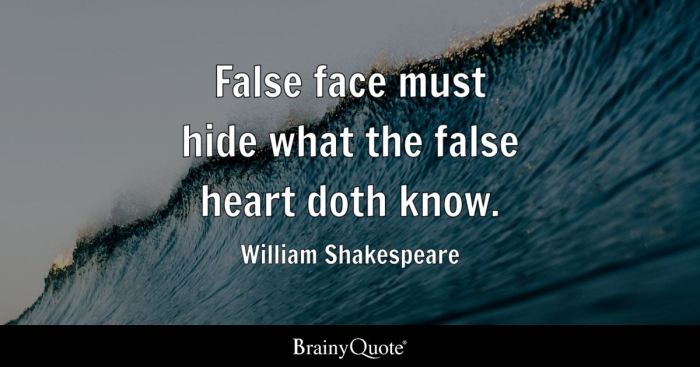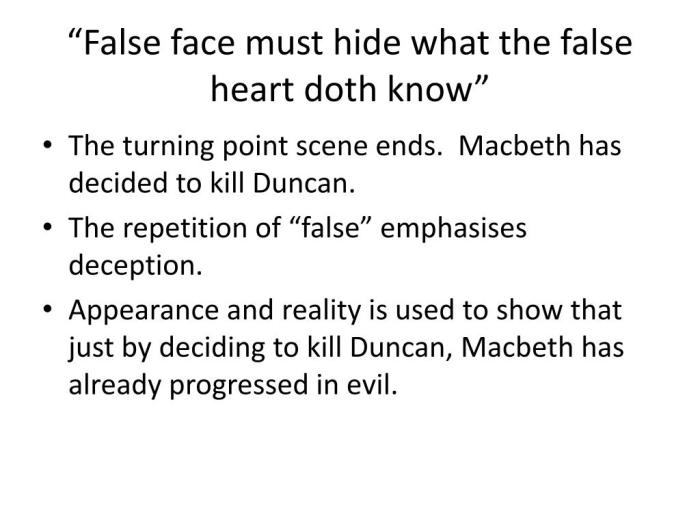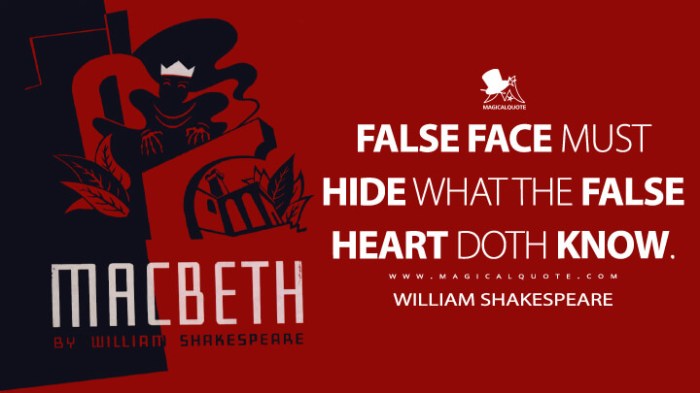False face macbeth character in quotes – False Face, a pivotal character in Shakespeare’s Macbeth, embodies the play’s themes of deception, illusion, and the supernatural. His enigmatic presence and cryptic utterances have intrigued scholars and audiences alike, making him a subject of ongoing fascination.
False Face’s connection to the witches and his possession of supernatural powers establish him as a harbinger of chaos and disruption within the play’s tragic events.
Character Overview

False Face is a mysterious and enigmatic character in Shakespeare’s Macbeth. He appears as one of the three witches who encounter Macbeth and Banquo on the heath, and he later takes on the role of the porter in the play’s famous “gatekeeper” scene.
False Face’s connection to the supernatural realm and his ability to deceive and manipulate make him a key figure in the play’s exploration of the themes of ambition, guilt, and the consequences of evil.
False Face’s motivations and actions throughout the play are driven by his desire to serve his master, the devil. He uses his supernatural powers to manipulate events and lead Macbeth and Lady Macbeth down the path of destruction. False Face’s deception and treachery make him a symbol of the evil that is at the heart of the play.
False Face in Quotes
- “By the pricking of thumbs, something wicked this way comes.” (Act 4, Scene 1)
- “Double, double toil and trouble; Fire burn and cauldron bubble.” (Act 4, Scene 1)
- “Fair is foul, and foul is fair: Hover through the fog and filthy air.” (Act 1, Scene 1)
These quotes reveal False Face’s connection to the supernatural realm and his ability to manipulate events. His words are often ambiguous and deceptive, reflecting the play’s themes of illusion and betrayal.
Symbolism and Interpretation
False Face is a symbol of the evil that is at the heart of Macbeth. His connection to the supernatural realm and his ability to deceive and manipulate represent the dark forces that are at work in the play. False Face’s appearance and actions contribute to the play’s exploration of the themes of ambition, guilt, and the consequences of evil.
Comparison to Other Characters, False face macbeth character in quotes
False Face is similar to other characters in Macbeth in his ambition and his willingness to do evil. However, he is unique in his connection to the supernatural realm and his ability to deceive and manipulate. False Face’s interactions with other characters, such as Macbeth and Lady Macbeth, shape their development and motivations.
False Face in Performance
Portraying False Face on stage is a challenging task for actors. The character is complex and enigmatic, and his connection to the supernatural realm can be difficult to convey. However, many actors have brought False Face to life with memorable performances.
One of the most famous portrayals of False Face was by Ian McKellen in the 1971 film adaptation of Macbeth. McKellen’s performance was both terrifying and sympathetic, and he captured the character’s complexity and ambiguity.
Quick FAQs: False Face Macbeth Character In Quotes
What is False Face’s role in Macbeth?
False Face is a mysterious character who appears as a servant to Macbeth and plays a key role in the play’s supernatural elements.
What are some of False Face’s most famous quotes?
False Face’s most famous quotes include “Fair is foul, and foul is fair” and “By the pricking of my thumbs, something wicked this way comes.”
How does False Face contribute to the play’s themes?
False Face’s character embodies the play’s themes of deception, illusion, and the supernatural. He represents the chaos and disruption that these themes bring to the play’s tragic events.

